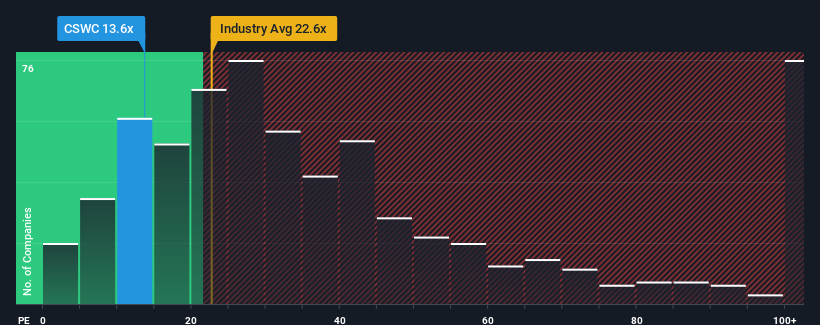- United States
- /
- Capital Markets
- /
- NasdaqGS:CSWC
It's A Story Of Risk Vs Reward With Capital Southwest Corporation (NASDAQ:CSWC)
When close to half the companies in the United States have price-to-earnings ratios (or "P/E's") above 18x, you may consider Capital Southwest Corporation (NASDAQ:CSWC) as an attractive investment with its 13.6x P/E ratio. Nonetheless, we'd need to dig a little deeper to determine if there is a rational basis for the reduced P/E.
Capital Southwest certainly has been doing a good job lately as its earnings growth has been positive while most other companies have been seeing their earnings go backwards. It might be that many expect the strong earnings performance to degrade substantially, possibly more than the market, which has repressed the P/E. If not, then existing shareholders have reason to be quite optimistic about the future direction of the share price.
View our latest analysis for Capital Southwest

Does Growth Match The Low P/E?
There's an inherent assumption that a company should underperform the market for P/E ratios like Capital Southwest's to be considered reasonable.
If we review the last year of earnings growth, the company posted a terrific increase of 86%. Still, incredibly EPS has fallen 31% in total from three years ago, which is quite disappointing. So unfortunately, we have to acknowledge that the company has not done a great job of growing earnings over that time.
Looking ahead now, EPS is anticipated to climb by 27% during the coming year according to the seven analysts following the company. With the market only predicted to deliver 13%, the company is positioned for a stronger earnings result.
With this information, we find it odd that Capital Southwest is trading at a P/E lower than the market. Apparently some shareholders are doubtful of the forecasts and have been accepting significantly lower selling prices.
What We Can Learn From Capital Southwest's P/E?
While the price-to-earnings ratio shouldn't be the defining factor in whether you buy a stock or not, it's quite a capable barometer of earnings expectations.
Our examination of Capital Southwest's analyst forecasts revealed that its superior earnings outlook isn't contributing to its P/E anywhere near as much as we would have predicted. There could be some major unobserved threats to earnings preventing the P/E ratio from matching the positive outlook. At least price risks look to be very low, but investors seem to think future earnings could see a lot of volatility.
Before you take the next step, you should know about the 4 warning signs for Capital Southwest (2 shouldn't be ignored!) that we have uncovered.
If these risks are making you reconsider your opinion on Capital Southwest, explore our interactive list of high quality stocks to get an idea of what else is out there.
New: AI Stock Screener & Alerts
Our new AI Stock Screener scans the market every day to uncover opportunities.
• Dividend Powerhouses (3%+ Yield)
• Undervalued Small Caps with Insider Buying
• High growth Tech and AI Companies
Or build your own from over 50 metrics.
Have feedback on this article? Concerned about the content? Get in touch with us directly. Alternatively, email editorial-team (at) simplywallst.com.
This article by Simply Wall St is general in nature. We provide commentary based on historical data and analyst forecasts only using an unbiased methodology and our articles are not intended to be financial advice. It does not constitute a recommendation to buy or sell any stock, and does not take account of your objectives, or your financial situation. We aim to bring you long-term focused analysis driven by fundamental data. Note that our analysis may not factor in the latest price-sensitive company announcements or qualitative material. Simply Wall St has no position in any stocks mentioned.
About NasdaqGS:CSWC
Capital Southwest
Specializes in credit and private equity and venture capital investments in middle market companies, mezzanine, later stage, mature, late venture, emerging growth, buyouts, industry consolidation, recapitalizations and growth capital investments.
Reasonable growth potential with slight risk.
Similar Companies
Market Insights
Community Narratives




